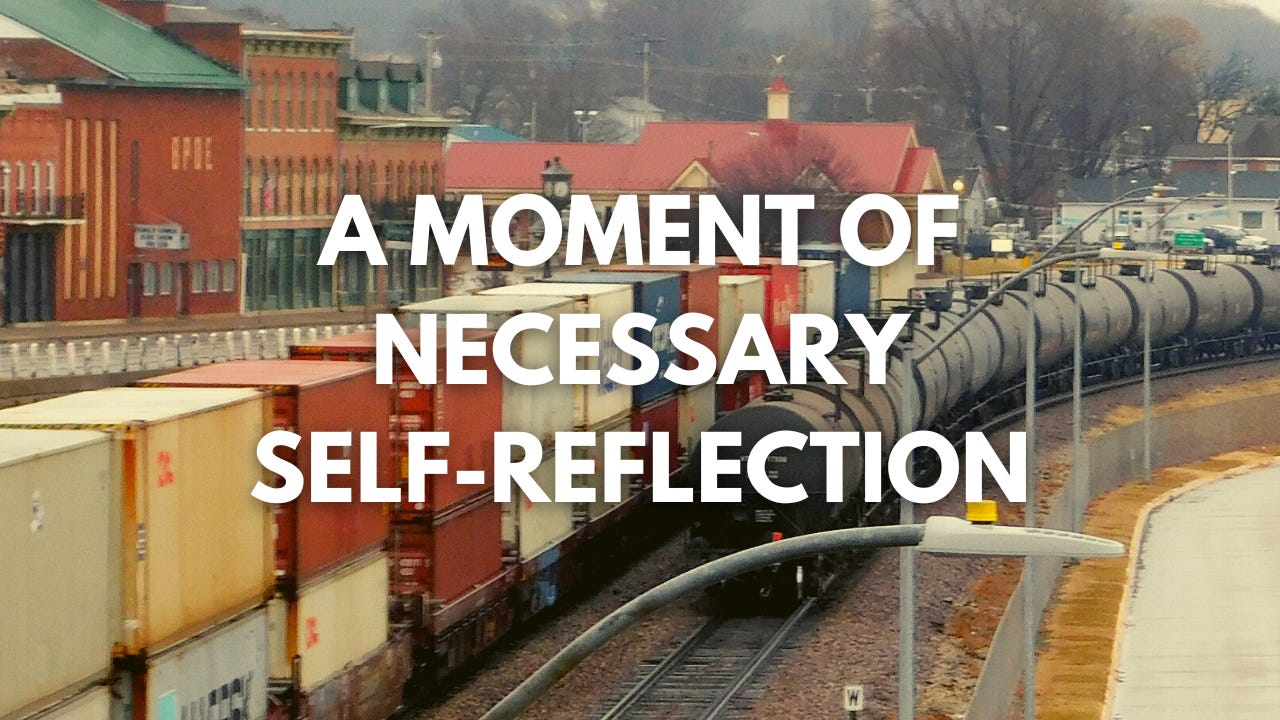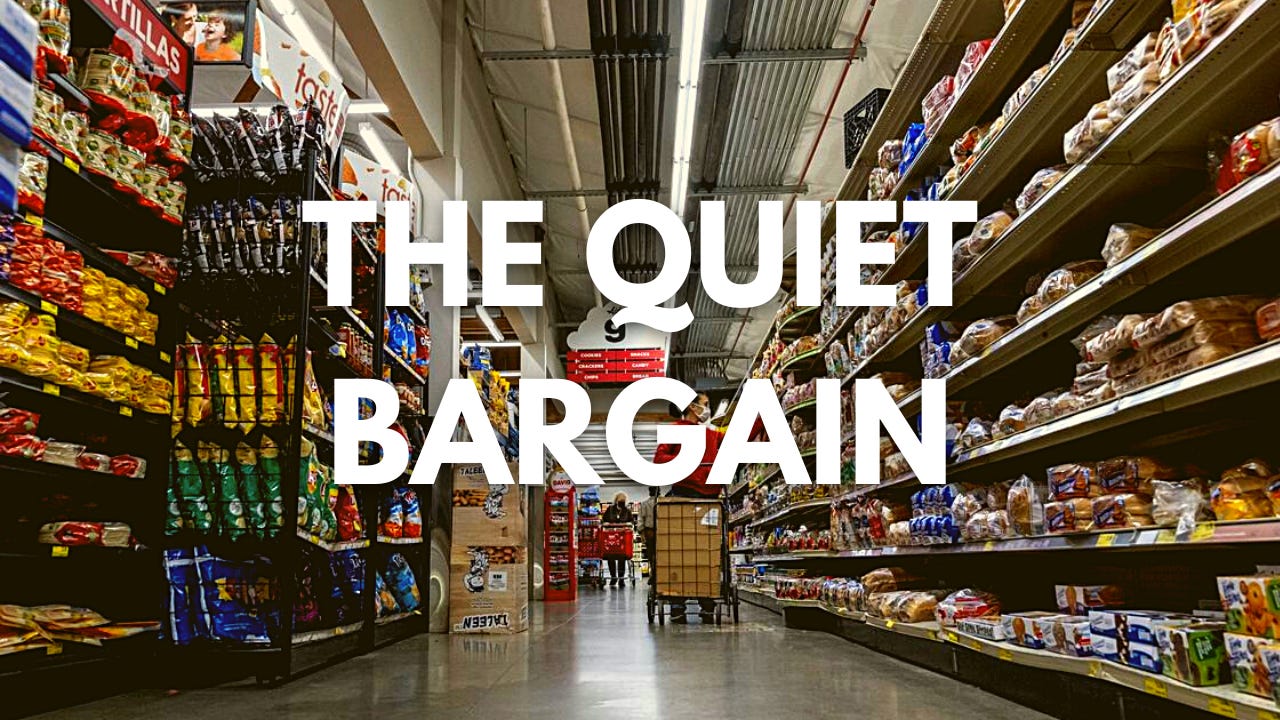A MOMENT OF NECESSARY SELF-REFLECTION
A possible railroad strike is the perfect time for us to ask: what price are we paying for this status quo and is it worth it?
Depending on where you get your news and how closely you pay attention, you might not have heard about one of the biggest stories in years. Right now, railroad workers are preparing to strike as early as this coming Friday if rail companies refuse to meet their demands. Their asks are telling. Time off for doctor visits. An address of conditions that have led to marathon shifts and around-the-clock assignments. It should be mentioned, before we move forward, that their employers are enjoying record profits as they push these terrible conditions on skeleton crews.
Predictably, our media, with its insistence on wealth-class perspective, is already covering this with little focus on those conditions and instead prioritizing the possible economic and political impact. Our supply chain is so fragile, after all, that even a slight hiccup could interrupt the pursuit of profit and abundance. Rail accounts for a massive amount of the country’s shipping, and stoppage would amount to much more than a hiccup. Even if most outlets aren’t covering this story very closely or making much of the situation, if there is a strike you will feel the repercussions.
The in’s and the out’s of this particular situation are important, but what this represents is a much, much larger issue that we must discuss. It isn’t flashy. God knows it isn’t as entertaining as the chaos sewn by Donald Trump or the My Pillow Guy getting his phone nabbed by feds outside a Hardee’s in Minnesota. Those stories, which have dominated our media for years now, culminating both in Trump’s election as president and the growing authoritarian threat, are reflective of a culture that has been taught to consume news as spectacle and a television show with twists, turns, dramatic revelations, and Heroes and Villains.
What we need to discuss is far from made-for-TV.
What we need to discuss is an existential issue. In fact, it is likely the defining existential issue of our age.
Hopefully, before you even read this, the railroad matter will be resolved. The companies will treat their workers with a shred of dignity and conditions will improve. A strike, which puts considerable stress on workers and their families, will be averted and the men and women involved will find their working conditions improved, their pay approaching something respectable, and the balance of power will shift, ever so slightly.
But regardless of what happens with the railroads, that larger issue remains.
And here is the question: Is this modern existence, with its conveniences and seemingly endless supply of gadgets, luxuries, and commodities, products upon products upon products, worth the continued suffering of others?
Is it worth our own declining conditions as workers, as citizens, as human beings?
Is it worth the destruction of the environment?
Is it worth the dismantling of democracy?
Is it?
This coming January Dutton/Penguin-Random House will publish my newest book THE MIDNIGHT KINGDOM: A HISTORY OF POWER, PARANOIA, AND THE COMING CRISIS.
You can pre-order it here.
Honestly, writing this was the hardest thing I’ve ever done, but the insight and information I gained was more than I could have ever hoped for. Tracing the path of white supremacy, the usage of Christianity to protect power, and the consequences of capitalism made this modern moment, and what we’re facing, so, so much clearer, and I can’t wait for you to read it.
I get asked a lot how people can support my work. Subscribing to DISPATCHES FROM A COLLAPSING STATE is definitely one way, but preordering books like this one makes a world of difference. Thank you, as always.
Our modern existence depends on a divide between what we directly experience and what we cannot see. To walk into a supermarket or store in the United States of America is to gaze at an array of products that have arrived on those shelves following invisible labor.
In some cases, it is as simple as the unseen labor in production centers and the transportation carried out by railworkers or truck drivers. That process involves multiple points of exploitation, including intentionally low wages, unreasonable shifts and expectations, and perpetually worsening conditions that put the laborers in unnecessary danger.
In others, particularly when it comes to imported products, the exploitation can be even worse and include dictatorial control by elements and actors who enjoy economic, political, and military support of superpowers like America to maintain control and keep production rolling and prices low.
The shiny packaging, professional advertising, and smiling mascots distract from very real and very pressing ethical considerations. They beg us not to consider the implications of our purchases in the same way the emphasis on the convenience of absurdly fast delivery by companies like Amazon and UPS obfuscate a culture where warehouse workers are held prisoner by punishing algorithms, human beings are forced to urinate in bottles, delivery drivers are literally being cooked in their trucks, and people are left on the floor to die while coworkers are ordered to get back to work.
Not to be flip, but these abuses are part of a larger bargain that has been made to exchange our lives and fortunes and well-being for readily-available, cheap garbage. We are working people to death, sacrificing our health and our futures, to have access to products that aren’t worth our time, our money, or our attention. We are selling out ourselves and our families and our future ancestors for bargain-bin electronics and boxes of Cap’n Crunch OOPS! All Berries.
In the past, the hope was that progress, with all of its ugliness and struggle, would eventually lead to a utopian existence where suffering, toil, and even death itself would be overcome and humanity might live in a new era of peace and bliss. That bargain was always an illusion, however, as much a distraction from material conditions as the promise that if we just let Elon Musk accumulate more wealth and more power eventually he’ll save us from a climate apocalypse and lead us into the stars.
Instead, in exchange for decent-paying jobs, basic education, sensible healthcare, and a functioning representative government, all we got are Red 40 and Yellow 5, food dyes meant to add artificial color to an ever-dimming world.
This arrangement depended on labor unions being crushed around the world, a pursuit carried out in the United States by both political parties, the spreading of neoliberalism as a destroyer of oversight, taxes, and impediments to consolidation. The accumulation of wealth by a tiny minority of individuals and corporations has now manifested in the buying off of representative government and a blossoming authoritarian movement dead-set on enforcing discipline on the population and labor force in order to increase profits beyond their current record heights.
Developments like this potential labor stoppage hint at a rebirth of democratic energies and solidarity that has been undermined in this process. It is absolutely crucial, in the neoliberal sense, for all of us to distrust one another, to see each other as competitors and dangers to what we have and what we could have.
Through this lens, the railworkers are inconveniencing us. A strike might lead to bare shelves, scarcity, higher prices. We lose sight of their humanity. We forget their suffering. Their families’ suffering. And, in the long run, that perspective damns us to be exploited when it comes to our jobs and our conditions because the reciprocity of distrust means there is no option for us to redress our own exploitation.
This current moment is another chapter in the larger story of American empire. Previously, following World War II and the Cold War, the United States created a global system of production and consumption wherein our country and its citizens sat atop the proverbial heap and reaped the rewards. In a tiered system, there were “first world” nations, including the U.S., Great Britain, and so on, and everyone else that fit within that paradigm as wells for resources and labor. Around the world the “lesser” countries and peoples were used to create affordable products and luxuries for those standing at the controls. Often their nations were led by dictators and strongmen who relied on the authority and firepower of the “better” countries to maintain conditions.
Eventually, from this system, capital was able to free itself from the nation-state through neoliberalism, which constructed global capitalism on the back of freed trade, austerity, and a push for redistribution of wealth from the bottom up. This eventually resulted in record inequality and the concentration of capital in the hands of a tiny group of individuals and corporations.
In a system of perpetual growth, record profits don’t mean much. There is always a need to grow, to expand, to find ways to increase the record. In the case of these rail companies, that means paying less, working people more, and juicing every bit out of what is already there. That is a microcosm of what we face here and around the world.
Previously, the United States stood atop this structure and its citizens enjoyed all the benefits of a cutting-edge consumer culture. Goods were manufactured elsewhere. The backbreaking work of production was out of sight, out of mind. But that arrangement could not last. Now, we are watching the exploitation that has been inflicted on the rest of the world boomerang back around and, as a result, our conditions are worsening.
The writing is very much on the wall. The rolling back of the progress of the 20th century, ranging from reproductive rights to labor regulations, has to be carried out for this to continue. The authoritarian movement fronted by the Republican Party is an element of this trend and is only growing more and more dangerous with every passing day.
This is not just a matter of voting against them. This is about changing our perspective, how we navigate the world. The drivers of this system are within us. They have changed us in ways we are often completely unaware of. It affects how we live, how we work, and how we view one another.
If there is a strike remember this. Inconvenience is part of any labor stoppage because it is a demonstration of how necessary the worker is in the larger structure. Resist the temptation to blame those workers who are only fighting for very basic rights. Support them as you would have them support you.
And if there is no strike, there will be another strike. Because these conditions necessitate them. Demand them. We have everything to gain by supporting one another through solidarity. And, honestly, we have nothing to lose but that which is hollow and meaningless anyway.






It's capitalism. And a long term railroad strike may win the workers a better wage and working conditions, but this will also guarantee that the GOP will regain power as they will blame Biden for supply interruptions and continued inflation. The whole country will pay the price for something most people did not intentionally cause.
The US didn't become a commerce giant by caring about its workers, but by convincing its populace that there is no difference between wanting and needing something. How often are products advertised as "must-haves" and "essentials" - until something shinier and prettier comes along? Why the hell am I now paying $5 for a loaf of bread?
My neighbor’s an engineer for BNSF, U.S. Marines veteran, and Trump supporter. His wife is a local elementary school principal. He mentioned, once, that he didn’t have a choice during the worst part of COVID epidemic, pre-vaccine era, he couldn’t take time off regardless of illness. His wife was home sick for 2+ weeks during that school year, but never him. It will be interesting to see if he supports a strike.